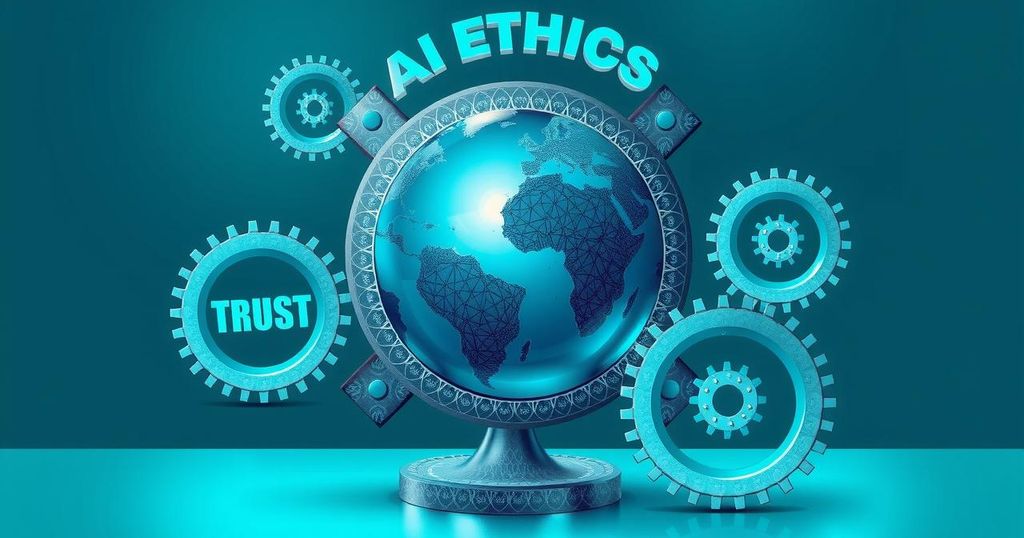Artificial Intelligence is integral to daily life in Nigeria, influencing various sectors such as finance and hiring. However, the lack of representation of Nigerian values in AI systems poses a risk. Establishing national AI ethics regulations, focusing on local development, and engaging in global discussions are vital steps for Nigeria. Education on AI ethics can empower the public, while active involvement will ensure that AI technologies align with local needs and cultures.
Artificial Intelligence (AI) is a significant component of daily life in Nigeria, influencing various aspects such as social media interactions, financial services, and job opportunities. This technology impacts daily experiences, shaping how people communicate and access resources. The presence of AI is not merely a futuristic concept; it is actively dictating outcomes within Nigerian society, emphasizing the necessity for local representation in AI development and application.
A pressing concern arises regarding the representation of Nigerian culture and values within AI systems. Dr. Desmond Eteh articulates the need for Nigeria’s own AI policies in his articles, which underscore the importance of tailoring AI to local contexts. Various authors have echoed this sentiment, reinforcing the argument that Nigeria requires specific AI policies to foster innovation and address unique societal challenges.
AI systems are often developed in regions such as the United States and China, leading to questions about their applicability in Nigeria. The cultural and economic realities of Nigeria may not be adequately represented in these external AI developments. As Nigeria remains uninvolved in the ethical discussions surrounding AI, the nation risks becoming a passive recipient of technologies that may not resonate with its values and priorities.
The phenomenon of bias within AI is a global issue with distinct local implications. AI models learn from historical data, which often reflects societal biases. Evidence indicates that facial recognition technologies perform poorly on Black faces, highlighting how Nigeria could face unjust consequences under imported AI systems. This situation urges a reevaluation of who determines the ethical standards of AI technologies.
Active participation in decision-making concerning AI ethics is essential for Nigeria to safeguard its interests. If unchecked, biased AI tools could negatively impact hiring practices, medical diagnoses, and law enforcement in Nigeria, echoing similar issues seen elsewhere in the world. As such, Nigeria must take proactive measures to shape AI ethics, rather than react passively to decisions made elsewhere.
Establishing robust national AI ethics regulations is crucial for Nigeria. Consideration should be given to developing a governance framework that promotes fairness and accountability within AI applications. This includes forming regulatory bodies to oversee AI deployment and conducting audits in critical sectors such as healthcare and finance. Such frameworks can prevent the entrenchment of biases and promote a more equitable AI landscape.
Investment in African-centric AI development is paramount for Nigeria. By prioritizing the creation of indigenous AI solutions that address local challenges, Nigeria can foster innovation while minimizing dependence on foreign systems. Funding for research focused on ethical AI and the establishment of relevant AI research centers at universities would significantly contribute to this goal. Furthermore, support for tech startups dedicated to solving African-specific issues can enhance the development of effective AI applications.
Representation in global AI discussions is also significant. With Africa often excluded from key tech policy conversations, Nigeria must advocate for inclusion in international forums, including the United Nations and African Union. Ensuring that Nigerian policymakers and AI experts are involved in shaping global AI ethics is crucial for addressing the continent’s unique context and challenges.
Engagement and education around AI ethics must be prioritized to raise public awareness. Many Nigerians unknowingly interact with AI technologies that influence their lives. Incorporating AI ethics into school curricula can empower future generations, while tech hubs could facilitate workshops to discuss responsible AI usage. Transparency from companies about their AI-decision-making processes is also vital in fostering fair practices.
AI ethics is a pressing global concern demanding timely action from Nigeria. The nation must seize the opportunity to influence AI’s ethical landscape amid its burgeoning tech ecosystem. By focusing on regulation, investment, and advocacy, Nigeria can ensure AI contributes positively to society. The ethical foundations of AI will shape its future, determining whether it serves as a catalyst for progress or as a source of harm.
The future trajectory of AI in Nigeria remains in the hands of its leaders. The critical question is whether Nigeria will define the ethical guidelines for AI or remain subject to external influence. The decisions made today will shape the impact of AI on Nigerian society going forward.
Nigeria stands at a pivotal juncture concerning the development and ethical deployment of Artificial Intelligence. The necessity for tailored AI policies that reflect Nigerian values is imperative to avoid being passive adopters of foreign technologies that may not serve the local populace effectively. By establishing robust AI governance, investing in indigenous AI development, advocating for representation in global discussions, and educating the public, Nigeria can ensure that AI serves as a tool for progress rather than a source of unintended consequences. Immediate action is essential to shape an inclusive and ethical AI landscape in Nigeria.
Original Source: tribuneonlineng.com






